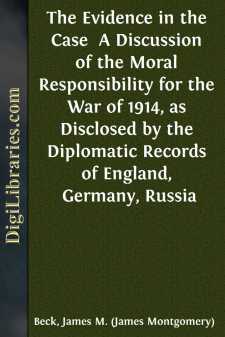Categories
- Antiques & Collectibles 13
- Architecture 36
- Art 48
- Bibles 22
- Biography & Autobiography 813
- Body, Mind & Spirit 142
- Business & Economics 28
- Children's Books 17
- Children's Fiction 14
- Computers 4
- Cooking 94
- Crafts & Hobbies 4
- Drama 346
- Education 46
- Family & Relationships 57
- Fiction 11829
- Games 19
- Gardening 17
- Health & Fitness 34
- History 1377
- House & Home 1
- Humor 147
- Juvenile Fiction 1873
- Juvenile Nonfiction 202
- Language Arts & Disciplines 88
- Law 16
- Literary Collections 686
- Literary Criticism 179
- Mathematics 13
- Medical 41
- Music 40
- Nature 179
- Non-Classifiable 1768
- Performing Arts 7
- Periodicals 1453
- Philosophy 64
- Photography 2
- Poetry 896
- Political Science 203
- Psychology 42
- Reference 154
- Religion 513
- Science 126
- Self-Help 84
- Social Science 81
- Sports & Recreation 34
- Study Aids 3
- Technology & Engineering 59
- Transportation 23
- Travel 463
- True Crime 29
Our website is made possible by displaying online advertisements to our visitors.
Please consider supporting us by disabling your ad blocker.
The Evidence in the Case A Discussion of the Moral Responsibility for the War of 1914, as Disclosed by the Diplomatic Records of England, Germany, Russia
Description:
Excerpt
INTRODUCTION
BY THE HON. JOSEPH H. CHOATE, FORMER AMERICAN
AMBASSADOR TO GREAT BRITAIN
For five months now all people who read at all have been reading about the horrible war that is devastating Europe and shedding the best blood of the people of five great nations. In fact, they have had no time to read anything else, and everything that is published about it is seized upon with great avidity. No wonder, then, that Mr. James M. Beck’s book, The Evidence in the Case, published by G. P. Putnam’s Sons, which has grown out of the article by him contributed to the New York Times Sunday Magazine, has been warmly welcomed both here and in England as a valuable addition to the literature of the day.
An able and clear-headed lawyer and advocate, he presents the matter in the unique form of a legal argument, based upon an analysis of the diplomatic records submitted by England, Germany, Russia, France, and Belgium, as “A Case in the Supreme Court of Civilization,” and the conclusions to be deduced as to the moral responsibility for the war.
The whole argument is founded upon the idea that there is such a thing as a public conscience of the world, which must and will necessarily pass final judgment upon the conduct of the parties concerned in this infernal struggle. Many times in the course of the book he refers emphatically to that “decent respect to the opinions of mankind” to which Jefferson appealed in our Declaration of Independence as the final arbiter upon our conduct in throwing off the British yoke and declaring our right to be an independent nation. That this “public opinion of the world” is the final tribunal upon all great international contests is illustrated by the fact that all mankind, including Great Britain herself, has long ago adjudged that our great Declaration was not only just, but necessary for the progress of mankind.
It is evident from his brief preface that Mr. Beck is a sincere admirer of historic Germany, and on the eve of the war he was at Weimar, after a brief visit to a little village near Erfurt, where one of his ancestors was born, who had migrated at an early date to Pennsylvania, a Commonwealth whose founder had made a treaty with the Indians which, so far from being treated as a “mere scrap of paper,” was never broken. Like many Americans, Mr. Beck is of mixed ancestry, being in part English and in part Swiss-German. He has therefore viewed the great question objectively, and without any racial prejudice.
A careful study of the diplomatic correspondence that preceded the outbreak of the war had convinced Mr. Beck that Germany was chiefly responsible for it, and he proceeds con amore to demonstrate the truth of this conviction by the most earnest and forceful presentation of the case.
Forensic lawyers in the cases they present are about half the time on the wrong side, or what proves by the final judgment to have been the wrong side, but it is always easy to tell from the manner of presentation whether they themselves are thoroughly convinced of the justice of the side which they advocate....



